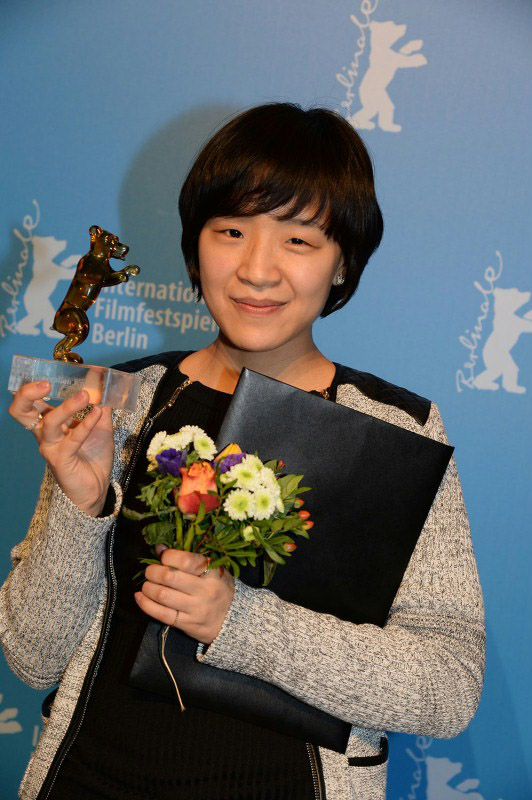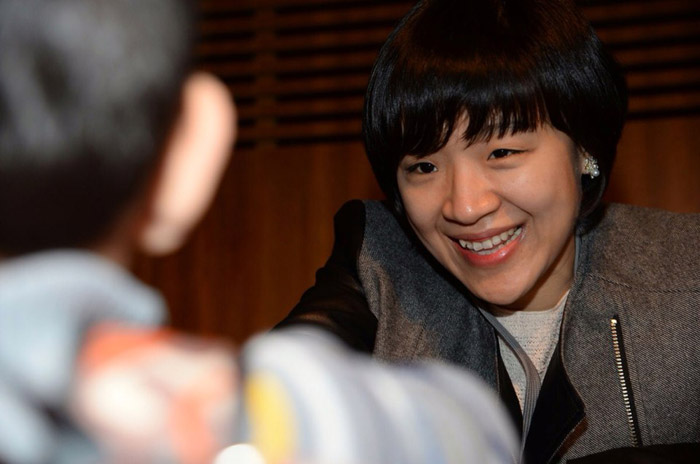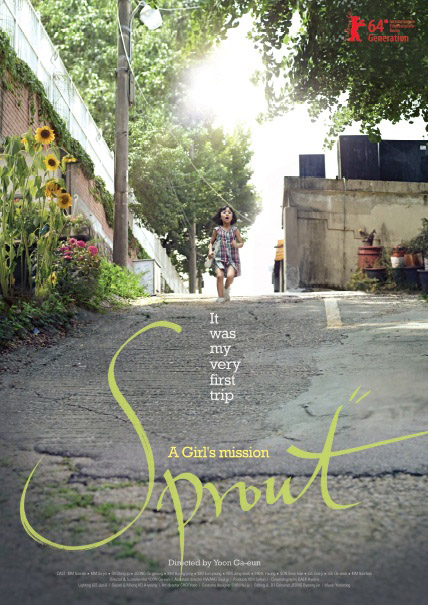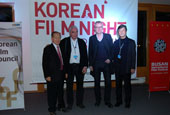Three Korean films received awards recently at the 64th Berlin International Film Festival. The winners were “Sprout,” directed by Yoon Ga-eun, “Non-Fiction Diary,” by Jung Yoon-suk, and “A Dream of Iron,” by Kelvin Kyung Kun Park.
The short film “Sprout” won the Crystal Bear for Best Short Film in the Generation Kplus category. Generation Kplus is for films about children and youth and aims at integrating children and youth into the festival’s film-aesthetic discourse, but is a place for encounters between people of all ages. “Sprout” is a story about little Bory who ventures out alone to buy bean sprouts missing from their meal to commemorate her late grandfather.
Both “Sprout” and “Non-Fiction Diary” are graduation works by Yoon and Jung, who studied at the Korea National University of Arts. “Sprout” was given a special mention for the Sonje Award at the 18th Busan International Film Festival (BIFF) in 2013. Earlier in 2012, Yoon also won a Grand Prix in the 34th Clermont-Ferrand International Short Film Festival for her film “Guest.”
“Non-Fiction Diary” and “A Dream of Iron” both received awards from the Network for the Promotion of Asian Cinema (NETPAC), which are awarded by a jury to the best Asian feature films. The forum section features avant garde and experimental works, essays, long-term observations, political reportage and yet-to-be-discovered cinematic landscapes.



“Non-Fiction Diary” received the BIFF Mecenat award for documentaries at the 18th Busan International Film Festival in 2013. This essayistic exploration asks serious questions about the traumatic events that shook Korea in the mid-90s, such as the collapse of the Seongsu Bridge and the Sampoong Department Store.
“A Dream of Iron” is a documentary about Korea’s industrialization as seen from the viewpoints of the steel and heavy industries. It was invited to the Documentary Fortnight held at the Museum of Modern Art in New York.
Korea.net recently held an interview with 32-year-old director Yoon Ga-eun, one of the winners at the Berlin International Film Festival.

- You received a Crystal Bear for Best Short Film in the Generation Kplus category. How do you feel?
I didn’t expect it at all. It was a shock to me. It was such a big award. I wondered if I could receive such a prize. The juries were made up of eleven adolescents. They were all selected randomly and this makes the award more meaningful. “Sprout” premiered at the 18th Busan International Film Festival. The Berlin festival was the third film festival in which the film was shown, and the first in Europe.
- Tell us the story of “Sprout.” What kind of message do you want to communicate through the movie?
Seven-year-old Bory ventures out alone to buy bean sprouts missing from their meal in commemoration of her late grandfather, who quite liked bean sprouts. Her parents did not allow her to go, but she went out anyway and faced unexpected discoveries throughout the day. It is an adventure story of a little girl who left home alone for the first time.
In the end, she fails to buy bean sprouts, but she makes her own discoveries and starts to see the world with different eyes and intuitively makes the right decisions.
As to why I wanted to make the movie, after I finished the film, I thought that people would strive all the time to achieve their goal, but there are things that they cannot achieve, no matter how hard they try. Then I realized that it is meaningful, by itself, to take a step forward.

- Short films and commercial films are different. There is a need to compromise and to make feature films appeal to a wider audience. Are you going to focus on short films?
“Sprout” was a graduation work. Obviously my goal is to make feature films. To do so, I have to write a screenplay for a feature film and that’s what I’m doing. I’ve started writing a few screenplays for feature length films, but I haven’t completed anything yet. If I write one, and make it into a movie, it will be my first. I have been working on a screenplay for the past 10 months.
- Like “Sprout” and “Guest,” you always deal with small things that happen in everyday life. Why do you focus on everyday life?
Because I like that kind of story. All kinds of things happen throughout life and I can find bits and pieces of them in everyday life. I like it. My films are about stories someone experiences in everyday life when something unexpected occurs.
- You also won the Grand Prix at the Clermont-Ferrand International Short Film Festival for the film “Guest.” What sort of responses have there been from film industries around the world after you’ve won this series of awards?
I received the awards but they are all for short films. I don’t think this is the path to feature films. They give me congratulations and encouragement, but there are directors out there who are more talented than I am and there are many famous awards and film festivals in Korea and elsewhere. I haven’t gotten very far yet. What is most important is to write a screenplay.
- How did you end up becoming a film director?
Ever since I was a kid, I always thought about becoming a director. When I was in elementary and middle school, I watched a lot of films. I saw a lot of them on television. It was a window into a world unknown to me. There are stories of pain and problems in everyday life that my parents or teachers didn’t explain to me. I felt comfort and joy when watching films. I always thought, in the back of my mind, that it would be nice to make such films.
In 2010, I enrolled in Sogang University. My major was history and religious science, but I joined a drama club when I was a freshman. I was involved in theatric art for a long time. I joined the club because I was interested in film. I loved drama. After graduation, I taught in some private institutes for a short while, but soon I returned to theater. I was an assistant director for two or three years for a play in which one of my senior students was a director. There were mechanisms of film which I could understand because I was involved in theater. If I hadn’t done anything in theater, I wouldn’t have understood the basic principles of film. I don’t know what I would have done if I hadn’t done dramas.
Each and every one of us has a story to tell. I was probably the same. The short films I’ve directed feature children as the main character. There were many such films centered on the lives of children, but now there are few of them. I want to make films in which a child, as the main character, learns about life. That is the kind of story I want to tell. Children are individuals who lead their life just like adults. I want to narrate stories about life from the viewpoint of children.

- Which directors were you most influenced by?
I wanted to become someone like director Lee Jeong-hyang who is known for her films “Art Museum By The Zoo” and “The Way Home.” I joined the drama club because of her.
There are many great directors who have influenced me. I learned a lot from directors who graduated from Sogang University, such as Lee Chang-dong. There are many great directors, but the ones I really like are those who have enough courage to experiment. The plot lines of many films have become similar to each other. It has become really hard to come up with truly new stories. Directors like Park Chan-wook and Bong Joon-ho have done a lot of experimentation with different types of films. They were not only fresh, but also fun. I thought I would like to have similar courage to be experimental and to make movies that are fresh and new.
- What are your favorite Korean and foreign films?
I don’t have a preference for one film in particular, but I really liked “E.T.,” by Steven Spielberg. I wish I could make that kind of movie. The main characters in the film are children, and it is a touching family movie. It is also a well-made movie.
Hirokazu Koreeda's “Nobody Knows;” Lee Chang-dong’s “Secrete Sunshine” and “Poetry;” Kim Tae-yong’s “Late Autumn” and “Family Ties;” Jung Ji-woo’s “Eungyo” and “Blossom Again;” they are all directors who stir sensitive emotions among viewers. I like that kind of movie.
- What kind of films are you working on?
I’m writing a screenplay for a full-length feature film. Recently, I’ve held meetings with my colleagues. If I write a screenplay alone, there is no way to find out whether it is well-written or not. I read the script with them and discuss what is good and bad. Although I write the dialogue alone, we go through the process and receive feedback from each other in order to produce a good screenplay.
- Is there a particular subject you want to work on?
I am thinking about it. I want to make films for a general audience. Most of the films shown in theaters are for 15-year-olds or older. There are not many movies for children. It is also hard to make them. I want to make family movies. I also want to continue to make good films for children. I like adventure stories. I like to tell easy, but touching, fun stories.

By Limb Jae-un
Korea.net Staff Writer
jun2@korea.kr

The short film “Sprout” won the Crystal Bear for Best Short Film in the Generation Kplus category. Generation Kplus is for films about children and youth and aims at integrating children and youth into the festival’s film-aesthetic discourse, but is a place for encounters between people of all ages. “Sprout” is a story about little Bory who ventures out alone to buy bean sprouts missing from their meal to commemorate her late grandfather.
Both “Sprout” and “Non-Fiction Diary” are graduation works by Yoon and Jung, who studied at the Korea National University of Arts. “Sprout” was given a special mention for the Sonje Award at the 18th Busan International Film Festival (BIFF) in 2013. Earlier in 2012, Yoon also won a Grand Prix in the 34th Clermont-Ferrand International Short Film Festival for her film “Guest.”
“Non-Fiction Diary” and “A Dream of Iron” both received awards from the Network for the Promotion of Asian Cinema (NETPAC), which are awarded by a jury to the best Asian feature films. The forum section features avant garde and experimental works, essays, long-term observations, political reportage and yet-to-be-discovered cinematic landscapes.

A scene from “Sprout” (photo courtesy of the Berlin International Film Festival)

“A Dream of Iron” narrates Korea’s industrial development. (photo courtesy of Kyung Pictures)

“Non-Fiction Diary” discusses social issues. (photo courtesy of Naver)
“Non-Fiction Diary” received the BIFF Mecenat award for documentaries at the 18th Busan International Film Festival in 2013. This essayistic exploration asks serious questions about the traumatic events that shook Korea in the mid-90s, such as the collapse of the Seongsu Bridge and the Sampoong Department Store.
“A Dream of Iron” is a documentary about Korea’s industrialization as seen from the viewpoints of the steel and heavy industries. It was invited to the Documentary Fortnight held at the Museum of Modern Art in New York.
Korea.net recently held an interview with 32-year-old director Yoon Ga-eun, one of the winners at the Berlin International Film Festival.

Director Yoon Ga-eun won the Crystal Bear for Best Short Film in the Generation Kplus category for “Sprout.” (photo courtesy of the Berlin International Film Festival)
- You received a Crystal Bear for Best Short Film in the Generation Kplus category. How do you feel?
I didn’t expect it at all. It was a shock to me. It was such a big award. I wondered if I could receive such a prize. The juries were made up of eleven adolescents. They were all selected randomly and this makes the award more meaningful. “Sprout” premiered at the 18th Busan International Film Festival. The Berlin festival was the third film festival in which the film was shown, and the first in Europe.
- Tell us the story of “Sprout.” What kind of message do you want to communicate through the movie?
Seven-year-old Bory ventures out alone to buy bean sprouts missing from their meal in commemoration of her late grandfather, who quite liked bean sprouts. Her parents did not allow her to go, but she went out anyway and faced unexpected discoveries throughout the day. It is an adventure story of a little girl who left home alone for the first time.
In the end, she fails to buy bean sprouts, but she makes her own discoveries and starts to see the world with different eyes and intuitively makes the right decisions.
As to why I wanted to make the movie, after I finished the film, I thought that people would strive all the time to achieve their goal, but there are things that they cannot achieve, no matter how hard they try. Then I realized that it is meaningful, by itself, to take a step forward.

A scene from “Sprout.” (photo courtesy of the Berlin International Film Festival)
- Short films and commercial films are different. There is a need to compromise and to make feature films appeal to a wider audience. Are you going to focus on short films?
“Sprout” was a graduation work. Obviously my goal is to make feature films. To do so, I have to write a screenplay for a feature film and that’s what I’m doing. I’ve started writing a few screenplays for feature length films, but I haven’t completed anything yet. If I write one, and make it into a movie, it will be my first. I have been working on a screenplay for the past 10 months.
- Like “Sprout” and “Guest,” you always deal with small things that happen in everyday life. Why do you focus on everyday life?
Because I like that kind of story. All kinds of things happen throughout life and I can find bits and pieces of them in everyday life. I like it. My films are about stories someone experiences in everyday life when something unexpected occurs.
- You also won the Grand Prix at the Clermont-Ferrand International Short Film Festival for the film “Guest.” What sort of responses have there been from film industries around the world after you’ve won this series of awards?
I received the awards but they are all for short films. I don’t think this is the path to feature films. They give me congratulations and encouragement, but there are directors out there who are more talented than I am and there are many famous awards and film festivals in Korea and elsewhere. I haven’t gotten very far yet. What is most important is to write a screenplay.
- How did you end up becoming a film director?
Ever since I was a kid, I always thought about becoming a director. When I was in elementary and middle school, I watched a lot of films. I saw a lot of them on television. It was a window into a world unknown to me. There are stories of pain and problems in everyday life that my parents or teachers didn’t explain to me. I felt comfort and joy when watching films. I always thought, in the back of my mind, that it would be nice to make such films.
In 2010, I enrolled in Sogang University. My major was history and religious science, but I joined a drama club when I was a freshman. I was involved in theatric art for a long time. I joined the club because I was interested in film. I loved drama. After graduation, I taught in some private institutes for a short while, but soon I returned to theater. I was an assistant director for two or three years for a play in which one of my senior students was a director. There were mechanisms of film which I could understand because I was involved in theater. If I hadn’t done anything in theater, I wouldn’t have understood the basic principles of film. I don’t know what I would have done if I hadn’t done dramas.
Each and every one of us has a story to tell. I was probably the same. The short films I’ve directed feature children as the main character. There were many such films centered on the lives of children, but now there are few of them. I want to make films in which a child, as the main character, learns about life. That is the kind of story I want to tell. Children are individuals who lead their life just like adults. I want to narrate stories about life from the viewpoint of children.

Director Yoon Ga-eun at the Berlin International Film Festival. (photo courtesy of the Berlin International Film Festival)
- Which directors were you most influenced by?
I wanted to become someone like director Lee Jeong-hyang who is known for her films “Art Museum By The Zoo” and “The Way Home.” I joined the drama club because of her.
There are many great directors who have influenced me. I learned a lot from directors who graduated from Sogang University, such as Lee Chang-dong. There are many great directors, but the ones I really like are those who have enough courage to experiment. The plot lines of many films have become similar to each other. It has become really hard to come up with truly new stories. Directors like Park Chan-wook and Bong Joon-ho have done a lot of experimentation with different types of films. They were not only fresh, but also fun. I thought I would like to have similar courage to be experimental and to make movies that are fresh and new.
- What are your favorite Korean and foreign films?
I don’t have a preference for one film in particular, but I really liked “E.T.,” by Steven Spielberg. I wish I could make that kind of movie. The main characters in the film are children, and it is a touching family movie. It is also a well-made movie.
Hirokazu Koreeda's “Nobody Knows;” Lee Chang-dong’s “Secrete Sunshine” and “Poetry;” Kim Tae-yong’s “Late Autumn” and “Family Ties;” Jung Ji-woo’s “Eungyo” and “Blossom Again;” they are all directors who stir sensitive emotions among viewers. I like that kind of movie.
- What kind of films are you working on?
I’m writing a screenplay for a full-length feature film. Recently, I’ve held meetings with my colleagues. If I write a screenplay alone, there is no way to find out whether it is well-written or not. I read the script with them and discuss what is good and bad. Although I write the dialogue alone, we go through the process and receive feedback from each other in order to produce a good screenplay.
- Is there a particular subject you want to work on?
I am thinking about it. I want to make films for a general audience. Most of the films shown in theaters are for 15-year-olds or older. There are not many movies for children. It is also hard to make them. I want to make family movies. I also want to continue to make good films for children. I like adventure stories. I like to tell easy, but touching, fun stories.

A poster for “Sprout” (image courtesy of Naver)
By Limb Jae-un
Korea.net Staff Writer
jun2@korea.kr




